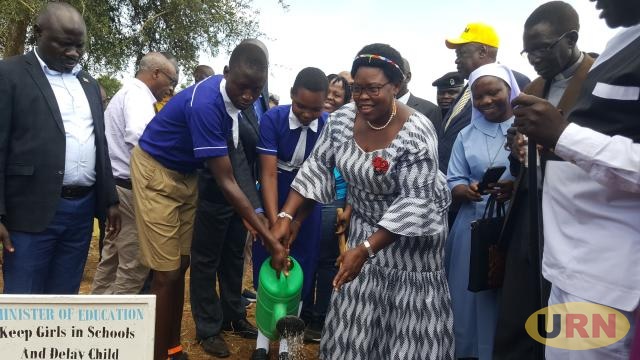
Moroto, Uganda | THE INDEPENDENT| United Nations International Children’s Emergency Fund in partnership with the Korean government has handed over Water, Sanitation, and Hygiene (WASH) facilities to schools after the closure of the 5-year Programme in the Karamoja sub-region.
From 2019 – 2023, UNICEF supported the government of Uganda with funding from the Korean government to implement a water sanitation and hygiene (WASH) in schools Programme. The program supported 92 primary and 8 secondary schools across 9 districts of Karamoja
The major focus was on WASH Infrastructure, and behavior change promotion intervention that comprises of climate resilient water system benefiting schools and nearby communities.
Munir A. Safieldin, the UNICEF Country representative says the WASH in schools is necessary to achieve sustainable development goals particularly goals related to improving the nutritional status of children and adolescents, universal access to primary education, and promoting gender equality.
Safieldin said that the program has been successfully implemented with multiple benefits to education and health outcomes.
He added that over 19,062 adolescent girls accessed menstrual hygiene products in all the 100 schools, and water committees demonstrated improved capacity to sustainably manage WASH activities.
He observed that at the start of the KOICA -UNICEF partnership in 2019, the pupil-to-stance ratio in Karamoja was unacceptably high and stood at 75:1 compared to the required national standard of 40:1. Safieldin noted that 37 percent of schools did not have water on the premises with school children having to fetch water from the community water points and losing academic time.
He revealed that the support provided has improved the school environment quality of learning and health of over 65000 children.
Safieldin attributed the achievement to the effective leadership of the Education Ministry, district local government, and the head teachers who were supported by the implementing partners such as the Institute for International Co-operation and Development as well as the private sector companies.
Jihee Ahn, the KOICA Country Director said that the successful completion of the WASH Programme in schools highlights the collaboration and collective commitment to enhancing the lives of children through improved health and environment.
Ahn noted that Karamoja is one of the most unique and distinctive regions with beautiful nature and a rich cultural heritage rooted in the society. She however observed that the children have faced significant challenges including limited water resources, inadequate sanitation Infrastructure, and prevalent waterborne diseases.
Ahn explained that they have engaged the local communities to strengthen the capacity of the water users committee and train hand pump mechanics for the sustainability of the water facilities.
According to Ahn, as the first phase of the project concludes, KOICA has approved the second phase of the project commencing in 2025.
She noted that the second phase will allow more schools in the region to benefit from WASH facilities and expand the scope of intervention to health centers and local communities.
Mary Moriku Kaducu, the State Minister for Primary Health Care who represented the Education Minister Janet Museveni in the closing ceremony in Kotido district said that they are mandated to champion the quality of education and this completed Wash program is timely to complement their effort to achieve the goal.
Kaducu noted that WASH in schools is nationally and globally recognized as a key intervention to promote children’s rights to health and a clean environment and to influence a generation change in health promotion behavior and attitudes.
She observed that if the schools can access clean and appropriate toilets, functioning hand washing facilities with sufficient and safe drinking water, and have developed adequate skills can make them perform better in schools.
She said that the Ministry shall continue working with partners and other government ministries to support the schools meet the national standards for enhanced outcomes.
Kaducu also urged the district officers to allocate some funds for major maintenance of water systems in schools from the ministry maintenance budget.
Brenda Atim, a pupil of Lomukura Primary School in Kotido municipality highlighted several challenges which they faced at school due to the lack of clean water.
Atim said that they used to walk for long kilometers away from school to search for clean water and this exposed them to warriors who were targeting them for marriage.
She noted that after the WASH project, the school became friendly to them because all the basic hygiene necessities were provided at school.
Atim observed that this enabled many of them to stay at school and ensured the completion of primary-level education.
Peter Abraham Loiki, the Member of Parliament for Jie County in Kotido district urged the partners to consider getting out the children who are still trapped in the kraals and put them to school.
Loiki said that there are so many children who have no access to education and efforts to trace them are frustrated by limited resources.
He said that they have also been advocating for free and compulsory education for all the children in the region and the government is yet to fulfill this.
He noted that the region can only be transformed if the government collaborates with partners to ensure that all the children are withdrawn from the kraals and taken to school.
Peter Lokeris, the Minister for Karamoja Affairs noted that they wish to fully support the education system in the region but their efforts are frustrated by limited resources.
Lokeris appealed to the partners to continue supporting children in the schools to transform the region.
Lokeris challenged the local leaders to rally children to stay at school and study instead of wasting their time in the kraals. He also observed that the parents are slowly embracing education following the numerous sensitization messages on the importance of education.
*****
URN
 The Independent Uganda: You get the Truth we Pay the Price
The Independent Uganda: You get the Truth we Pay the Price





